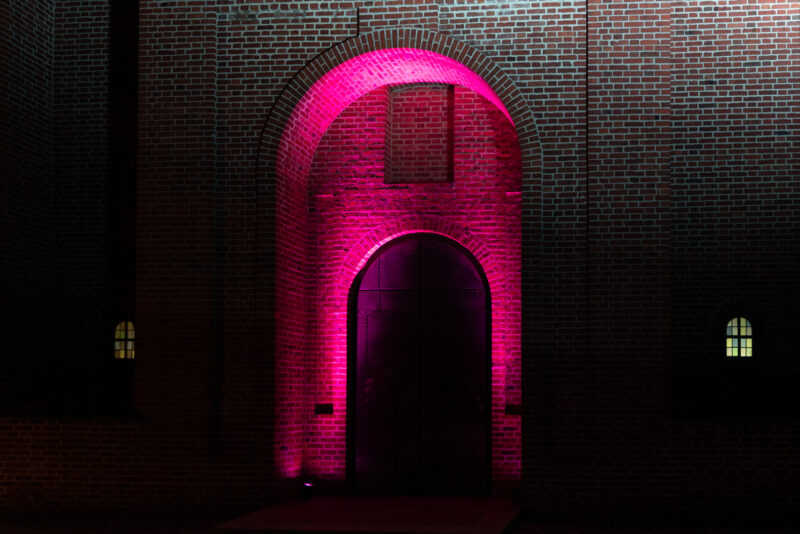SOUND ARTIST ARTURAS BUMŠTEINAS MADE THE ORGANS OF THE AUGSBURG CHURCH SING

Entrance to St. Thaddäus Church. Photo by Katarina Sopcic
On 28-29 October, the Lab30 programme of the Augsburg media arts festival included the composition Double Life of a Pipe Organ by sound artist Arturas Bumšteinas, composed specifically for the space of St. Thaddäus Church and its organ in Augsburg. The multi-layered sound story, which was told not only by the church organ, flute and sound recordings but also by the “musicalised” church space itself, was part of the programme of the Lithuanian culture season in Bavaria.
Performing the piece alongside Bumšteinas were Mėta Gabrielė Pelegrimaitė (flute) and Augsburg organist Elisabeth Römer.
According to Bumšteinas, this composition fused two ways of talking about space: one is pre-recorded and controlled during the concert, and the other is live sound. Encoded in the title of the composition are two dimensions of reality in which the piece exists: the two-dimensional space of the musical scores and the space of the sound phenomenon itself.
The organ is a special instrument in the work of the sound artist. In 2008, he started his ongoing project Organ Safari: during his travels around Lithuania and Europe, he recorded the sounds of the organ in churches, concert halls, streets and other spaces. The accumulated archive of sounds has become the source of many acoustic, electroacoustic and other projects. In 2016, Bumšteinas travelled around the towns of Saxony and collected organ records of this German state. The project Chronicles of Orgelsafari was presented in 2017 during the Leipzig book fair, where Lithuania was the guest of honour. In 2021, the composer turned his attention to the organ again: before the performance in Augsburg, Bumšteinas presented two compositions for the organ in Copenhagen and Berlin.

Organist Elisabeth Römer. Photo by Katarina Sopcic
Lab30: a media festival for lovers of experimental art in Augsburg
The Lab30 media festival, which celebrates its twentieth anniversary this year, began with Augsburg’s artists looking for space for their experimental electronic music events and setting up a festival. According to Barbara Friedrichs, Lab30’s organiser, the festival was initially a “classic niche event for nerds and programmers” but its audience has changed over the years: “Now the festivals attracts equally lovers of contemporary art and children. Those who were the first to discover our concerts, exhibitions, installations and other events a couple of decades ago now come with their families,” said Barbara.
The programme for this year’s festival, spanning three weekends in October and November, featured visual arts exhibitions, experimental music concerts and guided night tours.
Barbara Friedrichs calls the Augsburg cultural scene vibrant and rich: “I think it’s partly related to our history: the city was founded by the Romans; this is where Mozart’s father was born, as well as Bertold Brecht and Rudolf Diesel. We can say that we really have something to add to the calendar of cultural events,” joked Barbara. “Of course, in addition to historical figures and themes, there is a strong community of contemporary artists here. Although there is no art school in Augsburg, its high-level university of applied sciences has a great influence,” said the festival organiser.
An exhibition of works by the painter Patricija Jurkšaitytė titled Shelters // Bleiben will be open at the Neue Galerie im Höhmannhaus in Augsburg until December.
The final events of the Lithuanian culture season in Bavaria took place in November
In November, the final events of the Lithuanian cultural season took place for three days at the Blaibach Concert Hall. The contemporary music ensemble Synaesthesis, which has won the prestigious Bavarian Prize, the special Ernst von Siemens ensemble prize, performed the Lithuanian composer Žibuoklė Martinaitytė’s piece The Hadal Zone, which the composer was writing while residing in Blaibach this summer.
In the lobby of the Blaibach Concert Hall, the exhibition Ancient Woods by G. Česonis will be opened. For this show, the photographer captured the oldest trees in the forests of Kaunas vicinity and during his summer residence in Blaibach, following his vision of the impenetrable forests that once connected Lithuania and Bavaria. The Lithuanian chamber choir Aidija compared Lithuanian and German choral culture, and in another event, accordionist Martynas Levickis performed a programme of a wide stylistic range.
The project Without Distance: Lithuanian Cultural Season in Bavaria 2021 (Ohne Distanz – Litauische Kultur in Bayern 2021) initiated by the Lithuanian Cultural Attaché in Germany is organised by the Lithuanian Culture Institute and funded by the Lithuanian Ministry of Culture. Partners: the Lithuanian Embassy in Germany and Bavarian cultural organisations.
You can listen to Arturas Bumšteinas’ piece Double Life of a Pipe Organ here: